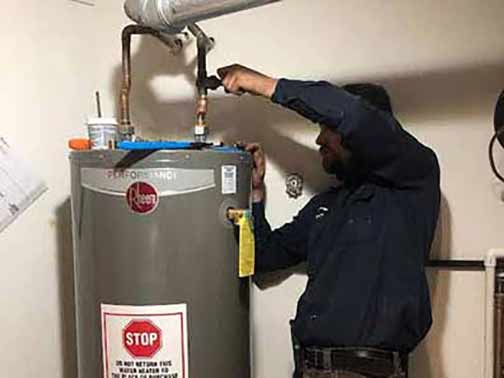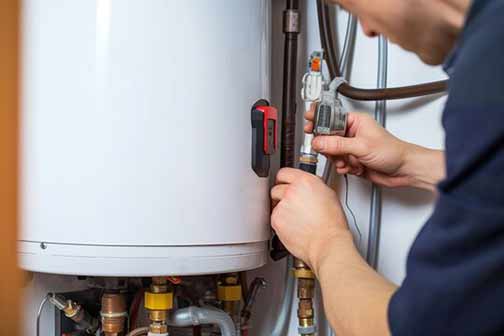Understanding the Importance of Water Heater Management
Water heaters are essential components of modern homes, providing the necessary hot water for daily activities such as bathing, cooking, and cleaning. Efficiently managing water heater issues is crucial to ensure a continuous hot water supply and to avoid unnecessary expenses. Below we will help you master the decision-making process for water heater management, covering the efficiency, cost, and timing of repairs in contrast to replacement.
Recognizing the Signs That Your Water Heater Needs Attention
Recognizing the signs that your water heater needs attention is the first step in efficient management. Common indicators include:
- Insufficient hot water
- Fluctuating water temperatures
- Strange noises coming from the unit
- Visible leaks or water pooling around the heater
- Rusty or discolored water
- Age of the water heater (typically over 10 years)
Addressing these issues promptly can prevent further damage and help you decide whether to repair or replace your water heater.
Evaluating the Efficiency of Repairs for Water Heaters
When faced with water heater issues, the first consideration is whether repairs can restore the unit’s functionality efficiently. Repairs are often a cost-effective solution, especially for newer units that have minor problems. However, the efficiency of repairs depends on several factors:
- Cost of repair parts and labor
- Frequency of repairs needed
- Potential for recurring issues
- Energy efficiency of the repaired unit
If the repair costs are reasonable and the unit is expected to function efficiently post-repair, opting for repairs can be a sound decision. However, if repairs are frequent and costly, it may be more efficient to consider replacement.
Cost Comparison: Repairing vs. Replacing Your Water Heater
Understanding the cost implications of repairing versus replacing your water heater is crucial for making an informed decision. Here are some key considerations:
- Repair Costs: Repairing a water heater typically involves the cost of parts and labor. Minor repairs, such as replacing a thermostat or heating element, can be relatively inexpensive. However, more extensive repairs, such as fixing a leaking tank, can be costly.
- Replacement Costs: Replacing a water heater involves the cost of purchasing a new unit and the installation fees. While the initial cost is higher, a new water heater can offer improved energy efficiency and reliability, potentially reducing long-term expenses.
- Energy Savings: Newer water heaters are often more energy-efficient than older models. Upgrading to a more efficient unit can result in significant energy savings over time, offsetting the initial replacement cost.
By comparing the repair and replacement costs, you can determine the most cost-effective solution for your specific situation.
Timing Your Decision: When to Repair and When to Replace Your Water Heater
The timing of your decision to repair or replace your water heater is critical. Several factors can influence this decision:
- Age of the Unit: Water heaters typically have a lifespan of 10-15 years. If your unit is nearing the end of its expected lifespan, replacement may be more practical than investing in frequent repairs.
- Severity of Issues: Minor issues can often be resolved with repairs, but severe problems, such as a leaking tank or significant corrosion, may warrant replacement.
- Energy Efficiency: If your current water heater is outdated and inefficient, upgrading to a newer, energy-efficient model can provide long-term savings and improved performance.
- Cost of Repairs: If the cost of repairs is approaching or exceeding the cost of a new unit, replacement is likely the more economical choice.
By carefully considering these factors, you can make a well-timed decision that maximizes the efficiency and cost-effectiveness of your water heater management.

Environmental Considerations in Water Heater Management
Environmental impact is an important consideration when deciding whether to repair or replace your water heater. Newer models are designed to be more energy-efficient, reducing your carbon footprint and contributing to environmental sustainability. Additionally, proper disposal of old water heaters is essential to avoid environmental harm. Many manufacturers and retailers offer recycling programs to ensure responsible disposal of old units.
Choosing the Right Replacement Water Heater Unit
If you decide to replace your water heater, selecting the right unit is crucial for long-term efficiency and reliability. Consider the following factors when choosing a replacement:
- Type of Water Heater: There are various types of water heaters, including tankless, storage tank, heat pump, and solar water heaters. Each type has its advantages and disadvantages, so choose the one that best suits your needs and preferences.
- Size and Capacity: The size and capacity of the water heater should match your household’s hot water demand. An undersized unit may struggle to meet your needs, while an oversized unit can lead to unnecessary energy consumption.
- Energy Efficiency: Look for water heaters with high energy efficiency ratings, such as those with the ENERGY STAR label. These units are designed to consume less energy, reducing your utility bills and environmental impact.
- Cost and Warranty: Consider the initial cost of the unit and the warranty offered by the manufacturer. A longer warranty can provide peace of mind and protection against potential issues.
By carefully evaluating these factors, you can choose a replacement water heater that meets your needs and offers long-term efficiency and reliability.
Professional Installation and Maintenance of Water Heaters
Proper installation and regular maintenance are essential for ensuring the optimal performance and longevity of your water heater. Hiring a professional plumber for installation of a new water heater ensures that the unit is set up correctly and safely. Additionally, regular maintenance, such as flushing the tank, inspecting the anode rod, and checking for leaks, can prevent issues and extend the lifespan of your water heater.
Maximizing the Lifespan of Your Water Heater
To get the most out of your water heater, it’s important to take steps to maximize its lifespan. Here are some tips to help you extend the life of your water heater:
- Regular Maintenance: Schedule regular maintenance checks to ensure that your water heater is functioning properly. This includes flushing the tank to remove sediment buildup, inspecting the anode rod, and checking for leaks.
- Temperature Settings: Set the temperature of your water heater to the manufacturer’s recommended setting. This can help prevent overheating and reduce energy consumption.
- Insulation: Insulate your water heater and the surrounding pipes to reduce heat loss and improve energy efficiency. This can also help prevent freezing in colder climates.
- Water Quality: Ensure that the water supply to your water heater is clean and free of contaminants. Hard water can cause mineral buildup, reducing the efficiency and lifespan of your unit.
By following these tips, you can help ensure that your water heater operates efficiently and lasts as long as possible.
Wrapping It Up
Efficiently managing water heater issues requires a careful evaluation of the efficiency, cost, and timing of repairs versus replacement. By recognizing the signs that your water heater needs attention, evaluating the efficiency of repairs, comparing costs, and considering environmental impact, you can make informed decisions that avoid unnecessary expenses and ensure a reliable hot water supply.
Whether you choose to repair or replace your water heater, selecting the right unit and ensuring proper installation and maintenance are key to long-term efficiency and performance.


